فهرست مطالب

نشریه اقتصاد و جامعه
پیاپی 7 (بهار 1385)
- 222 صفحه، بهای روی جلد: 12,000ريال
- تاریخ انتشار: 1385/07/03
- تعداد عناوین: 9
-
صفحه 4
- بخش اول:
-
صفحه 8یکی از معماهای اقتصاد توسعه نقش منفی منابع طبیعی در رشد اقتصادی است که به بلا یا نفرین منابع معروف شده است. پژوهشگران اقتصادی و سیاسی در تلاش برای پاسخ به این معما تبیین های مختلفی ارایه داده اند. در این مقاله با دسته بندی این تبیین ها به دو گروه صرفا اقتصادی و اقتصاد سیاسی به مرور آنها می پردازیم. ...
کلیدواژگان: بلای منابع، بیماری هلندی، اقتصاد سیاسی، رانت جویی -
صفحه 28برداشت های ناقص از مفهوم و نظریه نوین توان رقابت (رقابت پذیری) موجب شده که هدفگیری ها و سیاست گذاری های این حوزه با ساده اندیشی هایی مواجه باشد و در نتیجه نتواند تاثیر قابل توجهی بر تقویت توان رقابت اقتصاد ایران در عرصه جهانی بگذارد. این مقاله پس از مروری بر ادبیات جدید توان رقابت اقتصاد در سطح کلان و ملی به معرفی مهمترین عوامل اثر گذار بر توان رقابت می پردازد. ...
کلیدواژگان: توان رقابت اقتصاد، اقتصاد ایران، توسعه و تجارت، محیط کسب و کار -
صفحه 54سیاست های تعدیل اقتصادی در سال 1990 میلادی از طرف جان ویلیامسون سیاست های اجماع واشنگتنی نام گرفت که در اواخر دهه 1970 تا اوایل دهه 1990 به شدت مورد حمایت نهادهای مالی بین المللی از جمله صندوق بین المللی پول، بانک جهانی و خزانه داری آمریکا برای اجرا در کشورهای در حال توسعه بود. ...
کلیدواژگان: دولت، اصلاحات، بازار -
صفحه 78آمایش سرزمین که تلاشی در جهت ساماندهی و نظام بخشی به فضای طبیعی اجتماعی اقتصادی ملی است تلفیق سه علم اقتصاد، جغرافیا و جامعه شناسی است و از این طریق اصلی ترین جهت گیری توسعه ملی در بلند مدت و مبتنی بر قابلیت ها و ظرفیت ها و موانع و محدودیت ها در تعامل با بخش های اقتصادی و هماهنگی بین بخشی و منطقه ای می باشد. ...
کلیدواژگان: آمایش سرزمین، تعادل فضایی، برنامه ریزی، توزیع متعادل - بخش دوم (تاریخ اقتصادی):
-
صفحه 96داگلاس نورث، اقتصاددان بزرگ نهادگرا و برنده جایزه نوبل اقتصاد در دو اثر برجسته و ممتاز خود یعنی (ساختار و دگرگونی در تاریخ اقتصادی) و (نهادها، تغییرات نهادی و عملکرد اقتصادی) به روشنی نشان داده است که با ابزارهای نئوکلاسیکی تحلیل اقتصادی بالغ بر چهار پنجم تاریخ بشر به صورت روشمند قابل تبیین نیست. ...
-
صفحه 168نزدیک به شصت سال از پایان جنگ جهانی دوم به عنوان سرآغاز موج توسعه خواهی در بیشتر کشورهای جهان سوم می گذرد. در این مدت سرمایه های عظیم مادی و معنوی کشورهای توسعه نیافته برای دست یافتن به توسعه هزینه گردیده است. اما در آغاز سده بیست و یکم هنوز بیش از هشتاد درصد از مردم جهان در کشورهای توسعه نیافته زندگی می کنند و از بهره مندی از بسیاری از دستاوردهای توسعه محرومند. ...
کلیدواژگان: تاریخ، فلسفه تاریخ، فلسفه نظری تاریخ، قانون، تصادف قانون علیت، نهاد و ساختار -
صفحه 188در دهه های اخیر بررسی سرمایه داری خانوادگی و عملکرد واحدهای اقتصادی خانوادگی مورد توجه پژوهشگران قرار گرفته است. هدف اصلی این مقاله مرور روندهای کلان و ویژگی های واحدهای اقتصادی و سرمایه داری خانوادگی و کاربست آنها به یکی از واحدهای سرمایه داری خانوادگی در ایران دوره پهلوی است.کلیدواژگان: سرمایه داری خانوادگی، انتقال نسلی، مدیریت حرفه ای، وفاداری اعتماد، کار آفرینی
-
صفحه 202رابطه اقتصاد به منزله عرصه تولید و توزیع ثروت جامعه با سایر عرصه های زندگی انسان نظیر سیاست و مذهب و فرهنگ و جز آن طی تاریخ اقتصادی چه بوده است؟ کارل پولانی از جمله معدود متفکرانی است که نه فقط چنین پرسشی را با ظرافت در انداخته بلکه از رهگذر خلق دستگاه مفهومی گسترده ای به پاسخ کاملا منحصر به فردی نیز دست یافته است. ...
-
Page 8One of the Puzzles of economic development is the negative sole of natural resources in economic growth which is known as “Resource Curse”. Economists and Political researchers here tried to find answer to this paradox. In this Paper we classity the views in two groups of purely economics and Political economics and try to evaluate them accordingly. Economic explanation based on statistics and quantitative models though may have more Precision, They are yet unable to provide answer to such a simple question as to why there are resource curse in some countries but not in others and what is the sole of politicians in this regards. On the other hand Political economists have thied to include in their analysis political, Social and Psychologcal factors as explanatory vasiables. Sespite their Comprehansineress, howers, this way of seasoning suffer from lock of quantitative measurment and statistical evidence. The weakness of both the explanations despute their mose sealistic approvimation is their generality and ambiguity in presentation. In this paper we try to follow into-diciplinasy approach taking into Considerations Subjects such as economice, Politics and Sociology using quantitature Vasiables in analysing Pokitical economy of resource curse.
-
Page 28Weak understanding of the Concept and theory of Competitiveness and Simplification of such Complex Process as Competitiveness in the Country has misdirected Policy Orientations as a Result it could not have significant impact on Iran’s economic Competition in International market. In this paper after reviewing the literature on the Subject we try to find out the main determinants of Iran’s Competitiveness in International market. While using international indices we try to estimate different aspects of Iran’s Conpetitiveness and highlight its weakness and strengths.
-
Page 54Economic Adjustment Policies which has been named as “Washington Consensus” by John Williamson in 1990 has emphasize beside others things on Privatization. This approach which has been highly Supported by international agencies Such as World Bank and International Monetary Fund has, however been criticized by the World Bank Ex-Chief economist and noble prize winner-Joseph Stiglitz. Here in this paper we shall review his thoughtful exoticism of “privatization as followed by developing Countries and Supposed by world Bank and international monetary Fund. Stiglitz is of the view that market and states are Complementary and not substitute to each other. These working together would guarantee the Success of the reforms. However, for the state to play a signaling sole it for to undertake necessary reforms in its apparatus. It is only after taking the necessary step to reform the state apparatus that privatization should be Understand Seriously
-
Page 78Making balance between environment, Population and economical Facilities in a country is an effort to organize national natural, Social and economical environment. It is a combination of three sciences of economy, geography and sociology. Which aims the national development for long term period and is based on abilities, capacities, barriers and limitations in connection with economical Sections and local and inter-sectional harmony. This approach to different elementary like human being, activity and environment as well as logical arrangement of activities in a country, can remove insufficiencies and local imbalances by making a superior document in planning system. National development which undoubtly is due to appropriate distribution of population, activity and effective benefiting from the whole capacities, abilities and preferences of a country can be acheived by adapting comprehensive and strategic plans in a period of time. Although, the Islamic Rep. of Iran has a 50 years background in planning for national development but due to different reasons... by a glance over the results of accomplishment of national development plans and comparing macro indices at different areas. .. imbalances in the country until exist.
-
Page 96Douglass North a great Institutional economist and a noble prize winner in his two distinguished works “structure and change in economic History” and “Institutions, Institutional changes and Economic Performance” clearly has shown that Confining to neoclassical tools we can not explain almost four fifth of human history on methodological basis.
-
Page 168It is almost 60 years since the end of Second World War when the wave of development efforts started in most of the third world countries. In this period huge amount of tangible and intangible Capital have been invested to uplift the standard of living of the people all over the world. However by the beginning of 21 st century more than 80 percent of world population are still living in Underdeveloped world and are deprived of most of development fruits. An important question that arises is why this is so. while allocation of resources are undertaken based on some economic logic can me say that at least partlyeconomic knowledge is responsible for such state ofaffaire? We believe that the main reason for this dismalperformance is applying pure economic knowledgedisregarding and or neglecting history
-
Page 188In recent decades the interest has been increased on the household Capitalism and the Way it functions by researchers. The aim of this paper is to review the macro trends and look into the peculiarities of economic units and household Capitalism taking into Consideration the Lajevardy Family as one of the household Capitalism of Iran under pahlavi dynasty
-
Page 202What has been the relationship between Economics as the Supplying sources of goods and Services and distribution of wealth with other spheres of human life such as Politics, religion, Culture and the likes in the Course of economic history? Karl Polani is one of those rare thinkers who not only raise such questions delicately but also provides an exclusive and Unique answers by way of creating detailed Conceptual system. Revlowing Polani’s thought we can find a framework to determine the place of economic system in society in the Course of historical development. The aim of this paper by Studding Polani’s work is to explore such thinking Framework.


